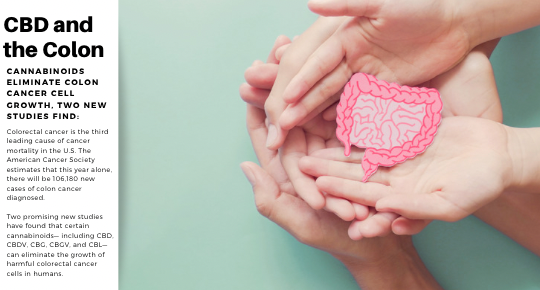
Cannabinoids Eliminate Colon Cancer Cell Growth, Two New Studies Find

Cannabinoids Eliminate Colon Cancer Cell Growth, Two New Studies Find
Colorectal cancer is the third leading cause of cancer mortality in the U.S. The American Cancer Society estimates that this year alone, there will be 106,180 new cases of colon cancer diagnosed.
Two promising new studies have found that certain cannabinoids— including CBD, CBDV, CBG, CBGV, and CBL— can eliminate the growth of harmful colorectal cancer cells in humans. These studies offer a guiding light to those researching cannabinoids for cancer treatment, although they are limited in their scope.
THC was not able to be included in the research group in either study due to regulations that don’t allow certain scientists to study it. The “psychoactive” cannabinoid was left out of the picture. But the studies do indicate that entourage effect with other cannabinoids like CBD, CBG, and CBL working in concert help to propel the “anti-proliferative” effect. One of the studies even points to the entourage effect with cannabinoids and mushroom extracts working together to reduce the cancer cells.
Cannabotech’s Integrative-Colon Study Eliminates 90% of Cancer Cells in Model
A new product coming to market in the U.S., U.K. and Israel in the fall of 2022 has been found to eliminate over 90% of colon cancer cells in a cell model. The product, called Cannabotech Integrative-Colon, used a combination of medicinal, non-psychoactive mushrooms and various cannabinoids to target colorectal cancer cells.
Cannabotech did not use psilocybin, the most common psychoactive mushroom, for this study. Nor did they study THC, only the other non-psychoactive cannabinoids. Today, there are over 100 known cannabinoids. I spoke with the study’s lead researchers, Professor Tami Peretz, a senior oncologist at Hadassah Ein Kerem Hospital, and Dr. Isaac Angel, a pharmacologist specializing in drug development, who explained more of their findings.
Cannabotech's "Integrative-Colon" products eliminated over 90% of colon cancer cells in a cell model experiment
Which cannabinoids exactly were used in this Cannabotech Integrative-Colon study? Since Cannabotech plans to sell this formula, its exact percentages and dosages of each cannabinoid is restricted information. “THC was not included,” the study’s leads Dr. Angel and Peretz say. “The key ingredients were CBD and several other minor cannabinoids. We cannot disclose their names and composition, as this is part of our proprietary information.”
The company decided not to study the effect THC would have, pointing to the difficulty in its accessibility and regulations. “We have not studied THC and therefore cannot comment on its eventual effects in this experimental setting,” they say. “We have deliberately excluded THC from the product as this is the key psychoactive ingredient in cannabis and we wanted to avoid this effect in our preparation. All the minor cannabinoids used are known and have no regulatory issue in their use.”
Cannabotech is aiming to make this a peer reviewed study in the future, its scientists tell me. “We are just in the beginning of our process and we report our results in several colon cancer cell line types. We are planning to extend the studies also into in vivo studies and finally publish it in a peer reviewed journal,” Dr. Angel and Peretz say.
The duo say they have not used the common psychedelic mushroom psilocybin, but instead, they used, “extracts from a mixture of known edible, non-psychoactive mushrooms,” they say. “Indeed, we have seen an interesting entourage effect not only when we have compared the single cannabinoids with the mixture, but also when we have included the mushroom extract with the cannabis extract.”
Second study finds cannabinoids can inhibit cancer cell growth in humans
A second study published recently from scientists at the University of Maryland’s Department of Nutrition and Food Science has found that cannabidiol exerts “anti-proliferative activity” in colorectal cancer cells, meaning it stops their growth.
The study states its findings are three-fold: “CBD represses viability of human colorectal cancer cells; CBD induces cell cycle arrest and increases apoptosis and ER stress in human colorectal cancer cells; and CBD represses cell viability and induces apoptotic cell death via a CB2-dependent mechanism.”
The cannabinoid receptor 2, one part of our endocannabinoid system, is the receptor where this effect was witnessed. That means our CB1 receptors may not point to the same effect, the “anti-proliferation” of these cancer cells in humans.
Cannabidiol exerts anti-proliferative activity via a cannabinoid receptor 2-dependent mechanism in human colorectal cancer cells - PubMed
“Our data indicate that CBD and its derivatives could be promising agents for the prevention of human colorectal cancer,” the study’s researchers writes. The scientists cited in this study include Hee-Seop Lee , Gillian Tamia, Hee-Jung Song, Darshika Amarakoon, Cheng-I Wei, Seong-Ho Lee.
The study found that this “anti-proliferative activity” was also observed for other cannabinoids including cannabidivarin (CBDV), cannabigerol (CBG), cannabicyclol (CBL), and cannabigerovarin (CBGV).
 Why Choose 8Labs CBD?
Why Choose 8Labs CBD?

 Message from 8Labs Founder & CEO
Message from 8Labs Founder & CEO

"We know that our CBD works, but we understand why you might be hesitant. There is a lot of misinformation about CBD out there. Don't worry, we are here to help answer any questions you may have. Welcome to your CBD journey!"
-Erin Lorenzana
Our hemp has a unique chemical composition. It is extremely rich in CBD and other cannabinoids with less than 0.3% THC. Therefore, our products do not have any negative effects associated with marijuana and THC use. With 8LABS CBD, you receive all the positive benefits of hemp’s full spectrum of components, with absolutely zero psychoactive effects.
8LABS CBD products contain the full spectrum of cannabinoids including CBC, CBG, CBDA, CBN and others. Additionally, our extracts contain terpenes - organic hydrocarbons found in the essential oils of plants. Together CBD, other cannabinoids and terpenes all interact synergistically to create what scientists refer to as an “entourage effect” that magnifies the therapeutic benefits of the plant’s individual components—so that the medicinal impact of the whole plant is greater than the sum of its parts.
We have a strict quality control program including on site chromatography reviews and independent lab tests on each batch of product. These reports confirm that the components of hemp remain potent, completely undenatured, and fully active. We maintain high standards of purity and potency to deliver only the highest grade CBD.
Article Source: https://www.forbes.com/sites/lindseybartlett/2022/05/30/cannabinoids-eliminate-colon-cancer-cell-growth-two-new-studies-find/?sh=65fff719b981

